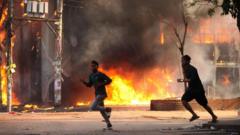The United Nations has released a report accusing the deposed government of Bangladesh, led by former Prime Minister Sheikh Hasina, of severe human rights abuses during last year's protests, suggesting these acts may amount to crimes against humanity.
UN Report on Bangladesh Violence Indicates Possible Crimes Against Humanity

UN Report on Bangladesh Violence Indicates Possible Crimes Against Humanity
A recent UN report suggests that the violent crackdown on protesters by the former Bangladeshi government could constitute crimes against humanity, highlighting extensive human rights violations.
The United Nations (UN) has released a damning report that accuses the former government of Bangladesh, led by Sheikh Hasina, of committing systemic violence against anti-government protesters, marking a period of unrest that could qualify as crimes against humanity. According to UN human rights investigators, the violent suppression of mass opposition last year resulted in an estimated 1,400 deaths, mostly at the hands of security forces.
The violence erupted from student-led protests over job quotas, which soon ignited nationwide demands for Hasina's resignation amid a brutal police crackdown. The severity of the unrest has been noted as the most extreme violence Bangladesh has experienced since its 1971 war of independence. UN rights chief Volker Türk stated that there is credible evidence indicating that the previous regime orchestrated a calculated strategy to suppress protests through extreme measures.
The UN findings assert that high-ranking officials involved in the former government's security forces actively participated in various human rights violations, including extrajudicial killings, arbitrary arrests, and torture. Among the victims were children, representing an alarming 13% of those killed between July and August 2022.
The report details gruesome instances of violence, such as the shooting of protesters at point-blank range and intentional harm inflicted on demonstrators. It concludes that the former government was aware of these serious offenses and that such brutality formed an "official policy to attack" dissenters. In response to these findings, Bangladesh's current caretaker leader Muhammad Yunus has expressed a commitment to build a nation where its citizens can live securely and with dignity.
The total death toll cited by the UN significantly exceeds government estimates, which recently noted 834 fatalities. The investigative team, which comprised human rights experts and other specialists, based their conclusions on over 230 interviews with witnesses and survivors, alongside medical records and video evidence. The report calls for further investigation into violence against both supporters of the former ruling party and marginalized groups, adding another layer of complexity to the situation in Bangladesh.





















